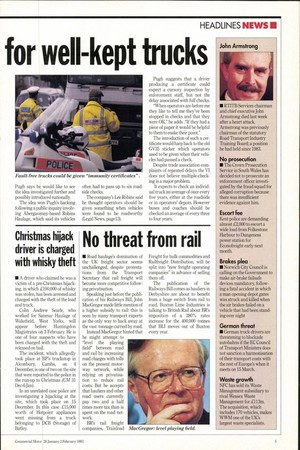Fewer checks for well-kept trucks
Page 6

Page 7

If you've noticed an error in this article please click here to report it so we can fix it.
by Karen Miles • Operators of well-maintained vehicles are set to benefit from "good conduct passes" which will free them from repeated delays at roadside checks.
The Vehicle Inspectorate is to talk to the Department of Transport about allowing enforcement staff to issue certificates to fault-free trucks, buses or coaches.
If the DOT agrees, these certificates could be shown to enforcement staff at roadside checks up to several days after the initial check, to avoid the need for fullblown repeat inspections.
This system has repeatedly been requested by the Freight Transport Association, Road Haulage Association and Bus and Coach Council: last week South Wales and West Midland traffic commissioner John Mervyn Pugh added his support.
The trade associations have argued that "good conduct certificates" would also enable operators to prove how many roadside vehicle inspections their vehicles have passed without problems. At the moment, they say, Traffic Commissioners only see the down-side of the vehicle check story, as represented by the number of prohibition notices issued at roadside inspections.
VI customer liason and business development director Hugh Edwards says: "We will probably suggest to the DOT that a paper of this sort would be sensible, although it would not be seen as a certificate of road worthiness ."
It has yet to be decided how long any "immunity" from further inspections would last.
Although the VI is only considering the certificate scheme for roadside checks, the idea could be extended to vehicles spot-checked at operators' premises. In a letter to VI chief executive Ron Oliver, Pugh says he would like to see the idea investigated further and possibly introduced nationally.
The idea won Pugh's backing following a public inquiry involving Abergav nny-based Robins Haulage, which said its vehicles often had to pass up to six roadside checks.
The company's Lee Robins said he thought operators should be given something when vehicles were found to be roadworthy (Legal News, page13).
Pugh suggests that a driver producing a certificate could expect a cursory inspection by enforcement staff, but not the delay associated with full checks.
"When operators are before me they like to tell me they've been stopped in checks and that they were OK," he adds ."If they had a piece of paper it would be helpful to them to make their point."
The introduction of such a certificate would harp back to the old GV35 sticker which operators used to be given when their vehicles had passed a check.
Despite trade association complaints of repeated delays the VI does not believe multiple-checking is a major problem.
It expects to check an individual truck an average of once every five years, either at the roadside or in operators' depots. However buses and coaches should be checked an average of every three to four years.






















































































